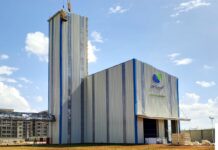African Agricultural Transformation Foundation (AATF) has emphasized the need to equip smallholder farmers with agricultural technologies that would improve the supply of diverse, safe and nutritious food across the value chains.
The Executive Director, AATF, Dr. Canisius Kanangire, at a presentation to the 2021 Food, Agriculture, Natural Resources Policy Analysis Network (FANRPAN) Policy Dialogue, said the foundation has championed for accessible and affordable agricultural technologies to African smallholder farmers that would significantly enhance their productivity and incomes.
“At the AATF, we continue to witness the transformative power of technologies when placed in the hands of small-holder farmers., through the Water Efficient Maize for Africa (WEMA) initiative driven by AATF, over 120 climate-smart drought-tolerant and insect-resistant maize varieties have been released, stressing that these varieties are suited to different agro-ecological zones and with the potential to increase maize yields by 40-60%,” said Kanangire.
FANRPAN Policy Dialogue
He added that cowpea production is expected to increase through the control of Maruca Pod Borer, adding that the benefits derived from the product include bumper harvests, higher incomes, and improved nutrition and health through reduced use of harmful insecticides. “Farmers will now be assured of better health especially regarding lower use of chemicals from eight sprays to only two,” he said.
He also said that the AATF is in the vanguard of encouraging mechanisation and agro processing through its Cassava Mechanisation and Agro-Processing Project (CAMAP) and AgriDrive.
“The CAMAP Project managed to bring over 65,300 hectares under mechanisation within five years in Nigeria, Uganda, and Zambia, benefitting over 850,000 smallholder farmers, majority of them women and youth who usually provide labor for cassava production,’ he said
The AATF boss said farmers who tried to mechanise their farms under the CAMAP had reported increased harvests from seven to nine MT/ha to over 25 MT/ha.
“The farmers also increased their earnings five-fold from $350 per ha to over $1,800 per hectares due to better quality tubers, increased yields, and greater market linkages,” he stated.
Kanangire pledged that the AATF would continue to engage in the annual FANRPAN Policy Dialogue, as a space to share the lessons on the role of agricultural technology and also engage with the policy and decision makers on the modalities for implementation. FANRPAN Policy Dialogue is an annual event that brings Governments and other agricultural policy stakeholders on agricultural transformation in Africa.









For food, safety comes first. AATF uses intelligent technology to change food supply. I don’t know whether safety can be guaranteed or whether it will be like genetically modified soybeans.
Comments are closed.